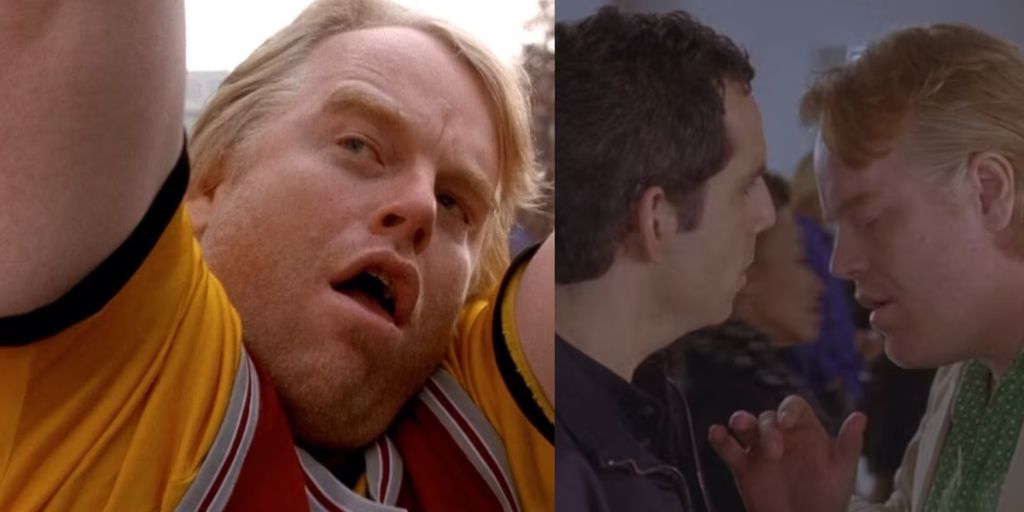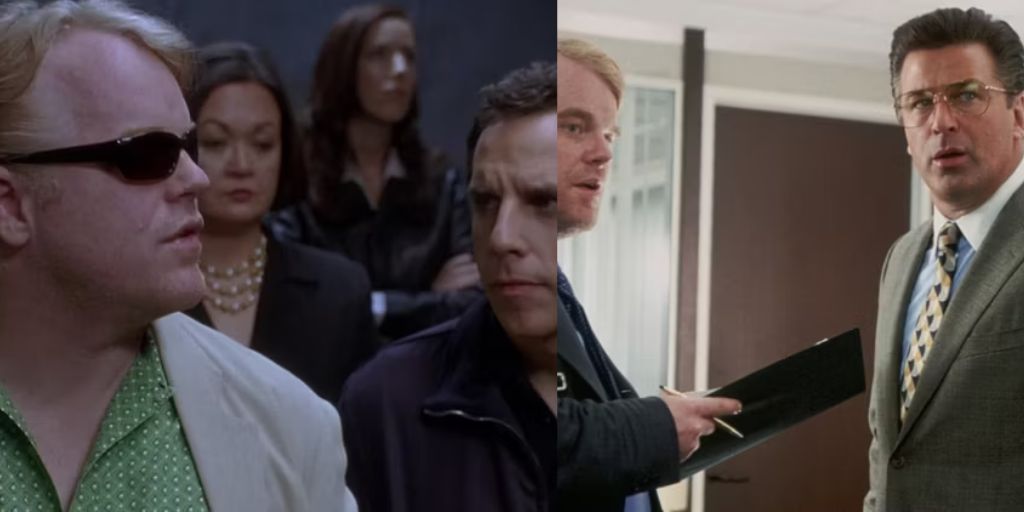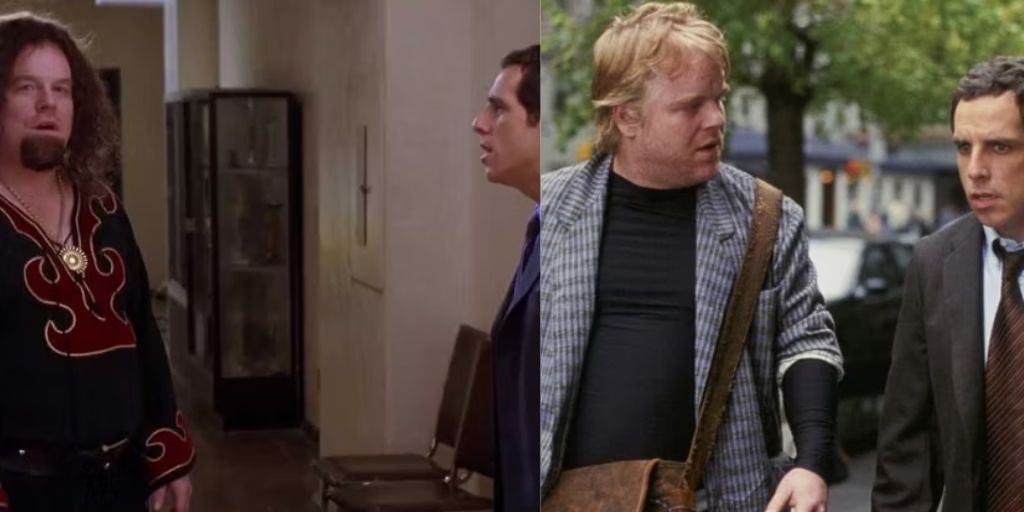When discussing why Philip Seymour Hoffman was one of the most versatile and powerful actors in the past 35 years, his comedic talent isn’t often mentioned. Most people remember him for his intense portrayals of anger, sadness, and an awkward yet charming demeanor.
He was one of the few actors who could take on almost any role, from providing comic relief in Twister to embodying moral compromise in his Oscar-winning role as Truman Capote in Capote. Although he leaned towards dramatic roles, he often took on comedic roles in films like Flawless and Charlie Wilson’s War.
However, his most memorable comedic performance was in Along Came Polly, where he stole the show from stars like Ben Stiller and Jennifer Aniston.
Hoffman Perfects the Role of a Washed-Up Loser
Along Came Polly follows Reuben (Stiller), an uptight risk assessor for an insurance company, as he falls for Polly (Aniston), a carefree and spontaneous woman, after being cheated on by his new wife, Lisa (Debra Messing).
The film’s plot is a typical romantic comedy, with the usual opposites-attract storyline, but the casting choices for the two leads don’t quite work. Ben Stiller’s character is too convincingly pitiful, and Jennifer Aniston’s portrayal of a free-spirited hippie feels forced, making their chemistry fall flat.
The movie becomes more enjoyable when it shifts focus to the supporting characters, like Alec Baldwin as Reuben’s over-the-top boss and Hank Azaria as the eccentric French lover who steals Lisa away. But the real star is Philip Seymour Hoffman, who plays Sandy Lyle, Reuben’s best friend.
Sandy is a former child star who found fame in a teen movie (clearly inspired by The Breakfast Club, as suggested by the film’s poster), only to crash and burn later in life. Now, he lives off his past success while performing in local theater, carrying himself with a mix of overconfidence and desperation.
Despite his loud, brash, and clueless behavior, Sandy is a loyal friend who will go to great lengths to help those he cares about, even if his attempts are misguided.
The film’s funniest moments come from the contrast between Sandy’s exaggerated self-assurance and his actual incompetence, and Hoffman delivers these scenes with passion and humor.
Sandy’s Inflated Confidence Anchors His Character
Sandy’s behavior is driven by an inflated sense of confidence that contrasts with his clumsy and awkward mannerisms. He moves like a wind-up toy that’s barely holding together, powered by a desperate need to prove himself.
Deep down, Sandy knows he’s a mess, but he covers it up with bravado, making him both insufferable and endearing. This dynamic is best illustrated in the film’s most famous scene: the basketball game. Sandy and Reuben play a pick-up game with two bigger guys, despite Reuben’s reluctance.

Sandy, full of false confidence, goads the other players into playing, oblivious to the fact that both he and Reuben are terrible at the game. While the scene is remembered for Reuben getting drenched in sweat by his opponent, the real highlight is Sandy’s disastrous performance on the court.
His dribbling is terrible, his shooting form is a mess, and he constantly demands the ball even when he’s clearly not open. The funniest part is when Sandy yells out ridiculous phrases like “OLD SCHOOL” and “WHITE CHOCOLATE” before missing his shots in the most humiliating way possible.
Sandy’s overconfidence shows up in smaller moments too. In one scene, Sandy loudly announces how attracted he is while in a crowded elevator at an art gallery. Later, he has an embarrassing accident that I won’t describe.
In another scene, Sandy, playing Judas in a local production of Jesus Christ Superstar, insists he should also play Jesus in a dual role, without considering how impractical or disrespectful that would be to the other actors.
One of the funniest moments comes when Reuben and Sandy are having pizza, and Sandy gives terrible dating advice while stealing Reuben’s pizza slice to add grease to his own.
He doesn’t even try to reassure Reuben that the date will go well, instead predicting it will go badly (and he ends up being right) but still supports Reuben in his own way. This scene perfectly captures Sandy’s blend of misplaced superiority and unexpected emotional support, and Hoffman makes sure Sandy is more than just comic relief.
Philip Seymour Hoffman’s Thoughtful Approach to Sandy
There’s a saying that actors should approach comedy with the same seriousness as drama, and Philip Seymour Hoffman embodies this principle in Along Came Polly. All Sandy really wants is some genuine validation, and seeing him receive it at the film’s climax is the most emotionally satisfying moment of the movie.
Reuben has a crucial meeting about a client he wants to insure but can’t attend, so he asks Sandy to fill in for him, pretending to be his associate. Sandy, clearly out of his depth, gives a self-important and rambling speech about a client he knows nothing about, awkwardly dressed in a suit and channeling an over-the-top sports coach.

Just when it seems all is lost, one of the board members recognizes Sandy from his old movie and compliments his presentation, leading to the client getting insured. The outcome is absurd, but the payoff is worth it just to see Sandy’s reaction.
He tries to hide his joy at finally being recognized for his talent, making it the most genuine moment in the entire film. Hoffman brings depth to Sandy, making him more than just a comedic character, and leaves the audience wishing they could see him play both Judas and Jesus at the same time. Philip Seymour Hoffman was truly a master at portraying both the best and worst of humanity.
Along Came Polly is available to stream on Netflix in the U.S.




